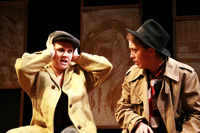What would happen if 6 million Jews were invited to go back to Germany?
That is what playwright Israel Horowitz asks in Lebensraum.
Seattle will get the chance to witness his answer to this question when it unfolds on stage at Seattle Public Theater at the Bathhouse on Green Lake, starting the weekend of Nov. 6. With a cast of 18 local high school students, the play will explore what happens when a contemporary Germany, in an act of redemption, invites back the people it brutalized half a century before.
As the director of a play full of “what ifs,” Shana Bestock has some questions of her own.
“What is the relationship of history to the present? To the future? Why do we look at mistakes of the past and say “˜Never again’ when we keep making the same mistakes?” she asks. “What does it take to move on from past wounds and deep hurts? What is the relationship of politics, economics and retribution? What is the role of storytelling in all this?”
Raised as a secular Jew, Bestock has used theater as a tool of learning and expression before. At 15, she says she had her real Bat Mitzvah experience when she played Anne Frank in a professional production. Now, as artistic director for Seattle Public Theater, she is working on a project that is close to her heart.
“I did make a little speech to the actors on the first day about how sometimes I’d be able to laugh and joke about the title, about the play, about many things,” she says, “but that some days I would find my sense of humor gone and in its place an inexplicable, unfillable well of sorrow. That has proved true.”
The title itself stirs emotion. The word “lebensraum,” which essentially means “living space,” was a rhetorical tool used by Hitler to justify expansion east, which involved the ethnic cleansing of Jews. The words once used to describe the foreign policy of the Third Reich have now been appropriated for the hypothetical act of redemption.
On the Bathhouse’s small stage, Lebensraum strings together an array of characters, emotions and locations. The cast and crew of teenagers — save three adults, including Bestock — have worked from the beginning to help the audience track the story as it jumps through time and space. Through the magic of theater, as Bestock puts it, they work with minimal sets and props in the intimate space allowing room for the house to use their collective imagination.
“With this play we wanted a heightened sense of theatricality and storytelling, since so much of it is breaking the fourth wall,” says Bestock, referring to the imaginary barrier between the actors on stage and the audience. “But we also wanted to be able to hide behind the fourth wall when necessary.”
The actors are committed to their roles and the thespian craft. For the last six weeks they have balanced school, study and extracurricular activities with rehearsals. While Seattle Public Theater is not a drama school, its staff considers it an educational program.
Here the students learn about the professional world of theater, which includes, according to Bestock, working together, self-discovery, taking risks and being challenged by the theatrical craft. In this case especially, the cast has had to think and discuss critically the themes of the play and their personal connection and responses to them.
Noelle McCabe, with the help of glue and fake facial hair, plays Maximillian Zylberstein, a Buchenwald survivor in his 70s who is accepted into the “Project Homecoming” and moves back to Germany. She says it is interesting to dive into a character who has some comic relief elements but is also damaged, vengeful, sad and grieving. Also, it is challenging for a 16-year-old girl to play an old man.
“Men move differently and have subtleties that no one would really notice in real life. However, in theater those subtleties are able to be seen,” says McCabe. “And if I’m not totally in character and start standing around like I would in real life, as a teenage girl in the halls at school, Zylberstein wouldn’t be as believable as a character.”
In this production, body language is not the only thing she worries about.
“When I get offstage sometimes, I am shaking a bit and my eyes are watering, because getting into Zylberstein’s character includes me having to live through his memories, images I never want anyone to experience in their lifetime.”
Casey Bouldin, also 16, plays Rudolph Stroiber, the Chancellor of Germany whose shame for his grandfather’s role in the Holocaust drives him to create “Project Homecoming.”
“I have been taught to look at both sides of things,” he says. “Some are easier to understand than others. But for this play, it is a matter of simply putting yourself in your character’s shoes and understanding why they feel what they feel. And again, that is what acting is all about.”
Theatrics are a good way to discuss issues like culture, genocide, guilt, anger, economics and retribution, says Bestock. The play allows experiences to be shared and questions to be raised without answers. And the occasional comedic relief helps too. As Maximillian Zylberstein puts it: “If you don’t laugh, you cry.”
“All good tragedy has comic elements. All good comedy is tinged with tragedy,” says Bestock. “Human beings are complex creatures; our joy springs from our knowledge of sadness and pain. And vice versa.”
Lillian Tucker is a student in the University of Washington Department of Communication News Laboratory.
